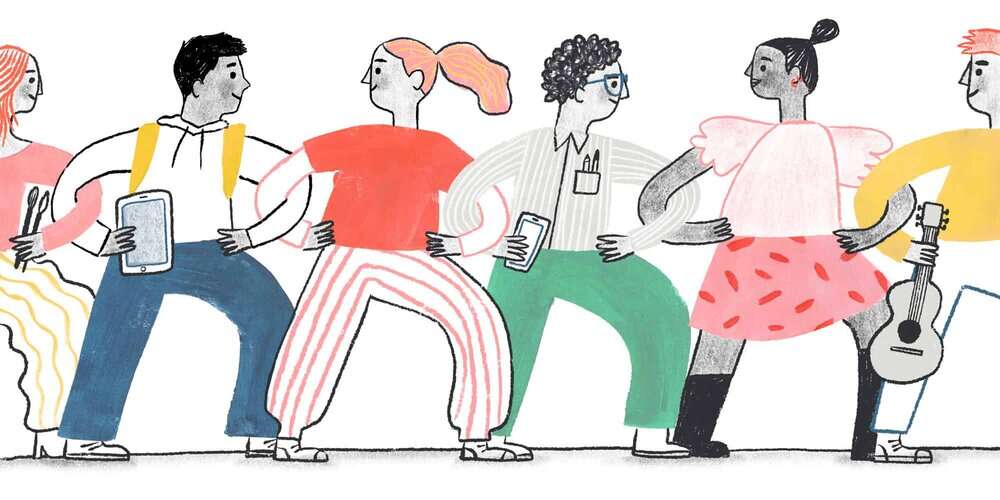Creating a Healthy Digital Life

Your digital life isn’t just the time you spend on social media. It’s also screen time for doing schoolwork, communicating with friends, gaming, watching videos, streaming shows or movies, and using apps for anything from creativity to self-care. Screens are part of your daily life, and the technology you use has plenty of benefits.
Digital life has pros and cons. Work with your parents to agree on a healthy balance and rules around safety, screen time, and social media.
What do you think?
Let’s put aside what parents, teachers, and experts say. How would you describe the pros and cons of your digital life? Striking a healthy balance is a lot like creating healthy relationships. Ask yourself:
- What do I like about digital media? What stresses me out?
- When do I feel energized and happy online?
- What makes me feel sad or anxious online?
- What platforms do I like or dislike, and why?
Figuring out what works for you can help you have a positive relationship with technology. It can also help you have better conversations with parents and others about your digital life.
Watch a video:
Opens in a new tabScreen Time: How Much Is Too Much? from Common Sense Education
Common Sense Education
Common Sense is a leading nonprofit organization working to make the digital world healthier and safer for kids and families
What does research tell us?
Time onscreen affects everyone differently. Research shows that many teens have both positive and negative experiences online. Some pros include:
- feeling less isolated or alone
- finding networks or groups that help you feel seen, supported, and understood (this may be especially helpful for LGBTQ+ youth, young people of color, and people in other marginalized communities)
- opportunities for learning, self-discovery, and self-expression
- opportunities for creativity, fun, and advocacy
- chances to practice skills that improve your mental wellness (like using apps to help with mindfulness).
In a survey of 8th and 10th graders, one in four reported spending five or more hours a day on social media, and one in seven spent seven or more hours. For more on social media and youth mental health, see Opens in a new tab The 2023 U.S. Surgeon General's Advisory.
Of course, it’s easy to get sucked in online, constantly checking to see what friends are doing, looking for likes, responding to messages, watching videos, or spending hours in a virtual world of gaming. But too much time online can hurt mental well-being. While more research is needed, current studies show that using social media for more than three hours a day can increase the risk of mental health disorders like depression, anxiety, or eating disorders.
Other drawbacks may include:
- interfering with good sleep, which affects how you feel and act. To quiet your brain and get ready for rest, you should ideally be off screens an hour before you go to bed, not scrolling or texting late into the night.
- feeling pressure to do things you’re not comfortable with or that are dangerous
- comparing yourself to unrealistic images of other people and curated lives
- getting too attached to likes or responses, tying your self-worth to online interactions or gaming wins instead of real-life experiences
- becoming less comfortable and less confident participating in real-life activities and interactions
- preferring to meet the need for social connection primarily through the fast-paced, virtual world of social media, videos, or games
- experiencing or being exposed to cyberbullying and harassment.
— submitted by a Young Person
Are you ready for social media?
Many social media platforms ask that users be at least 13 years old. Of course, many younger people actively use social media. Watch this Common Sense Education video, Opens in a new tabWhen is the Right Age to Start Social Media? that dives into the pluses and minuses of social media and why age matters.
— submitted by a Parent
Your online image
If you are using social media, think about how you want to present yourself online.
- How do your posts reflect who you are?
- Are you trying to create a picture-perfect image to match others that you see, or representing how you look and act in real life?
- How might others who see your profile think of you?
In addition to friends and classmates, consider family members, coaches or other adults in your life, or potential colleges or employers who might search your profile. You’ll also want to consider which social media platforms best meet your needs and intentions.
Watch a video Opens in a new tabTeen Voices: Who Are You on Social Media? from Common Sense Education.
Rules of the Road
Practice using digital spaces responsibly with respect, boundaries, and awareness.








